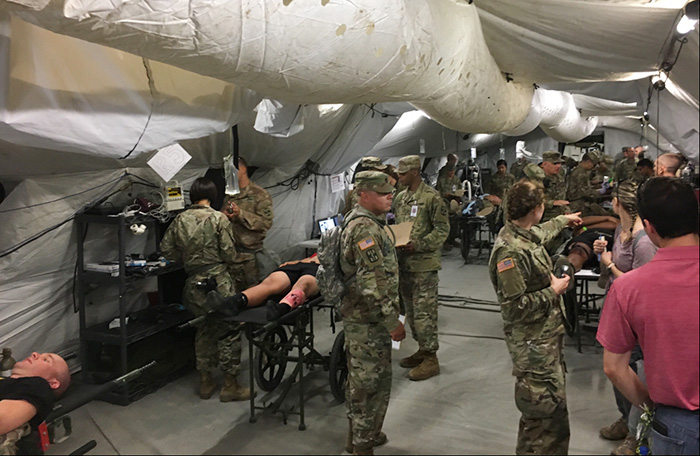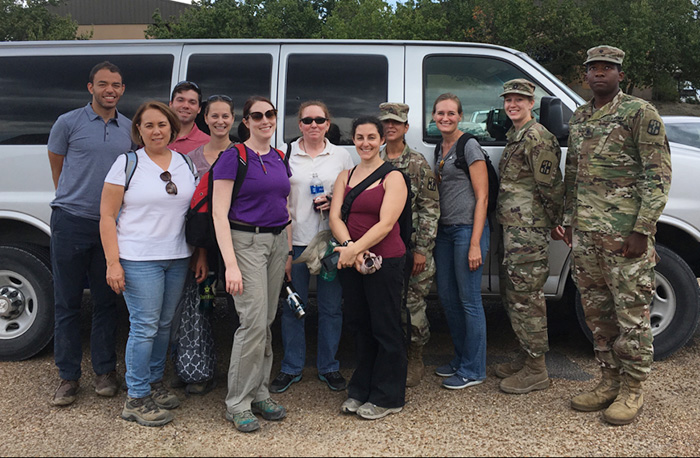USAMMDA team members participate in 32nd Hospital Center validation exercise

Last month, representatives from the U.S. Army Medical Materiel Development Activity participated in a validation exercise for the 32nd Hospital Center (deployable) at Fort Polk, Louisiana. The USAMMDA team included staff members from its Warfighter Deployed Medical Systems Project Management Office, Warfighter Brain Health PMO and Warfighter Expeditionary Medicine and Treatment PMO. The primary focus of the three-day visit was to observe medical equipment required to support the unit's patient care mission-essential task list.
Marie Cochran, WDMS PMO Medical Modernization assistant product manager, served as USAMMDA liaison for the exercise. Having been assigned to Combat Support Hospitals during her own military service, Cochran has a great deal of knowledge in this area of Army deployable health systems.
"Our main focus during the visit was to observe the validation exercise, and work with their leadership and clinical staff on any Class VIII (i.e. medical materiel) equipment issues that they were experiencing, or to answer or address any questions they had for us," said Cochran.
Cochran explained the purpose of this exercise, stating that it was the result of an Executive Order handed down from the U.S. Army Forces Command, or FORSCOM, which requires that within 180 days of each conversion of a CSH to a Hospital Center configuration, the unit must conduct a validation exercise to assess its ability to conduct missions effectively.
"As the 32nd is a deployable Hospital Center, we were there to assess their Class VIII equipment, and to answer any questions they had pertaining to the conversion and medical equipment fielding," said Cochran. "We wanted to address any shortages, so we could understand their commander's priorities, and push that back to our teams at USAMMDA, to help expedite filling any equipment shortages."

"Our goal is to maintain positive communication with these customers, and ensure the commanders and their staffs have the information they need to ensure unit readiness," she added.
The Medical Modernization office, along with the entire WDMS PMO team, moved to USAMMDA from the U.S. Army Medical Materiel Agency earlier this year as part of an Army realignment initiative to combine Army Medical program management and acquisition functions. Cochran explained that part of this trip to Fort Polk was to inform and educate the Medical Brigade and Hospital Center staff of the realignment from USAMMA to USAMMDA.
"Along with checking on the medical equipment, we were there to inform leadership about USAMMDA's role, after the recent changes at Army Materiel Command and in the Army Futures Command," she said. "For many years, all of this work was done by USAMMA, and everyone was familiar with that organization. But now that medical equipment life cycle management has moved under USAMMDA, we're doing our best to communicate this change to the units and their leadership – so they will know who and what office to contact if they have any questions, which is very important."
As a subordinate command of the U.S. Army Medical Research and Development Command, USAMMDA's mission is to develop and deliver quality medical capabilities to protect, treat and sustain the health of Service Members throughout the world – and Cochran is quick to point out there can be no breakdown in communication with regard to this critical task.
"We all have been working very hard to inform our customers about this change to USAMMDA – who we are, our PMO teams, and our leadership – so they can quickly reach out to our organization whenever they need information," she said.
In addition to the main task of observing the status of Class VIII equipment, Cochran detailed the professional development component of the trip, as members from USAMMDA's WBH PMO and WEMT PMO traveled to Fort Polk to witness the validation exercise and learn more about the factors surrounding a military deployment effort.
"Because we have a number of new team members at USAMMDA, who may not know a great deal about the deployed environment, we are working to coordinate with our PMOs to bring new assistant product managers and other new staff to these exercises," said Cochran. "We want to help these new folks gain knowledge on how best to communicate with these particular customers, understand the constraints a deployment brings to healthcare, and to learn how to find out what these customers need when it comes to the Class VIII equipment." Cochran escorted the USAMMDA team members throughout most of the day, focusing on Field Hospital areas and the unit's staff. As the WBH PMO staff focused on pertinent issues related to Traumatic Brain Injury and Post-Traumatic Stress Disorder, WEMT PMO deputy project manager Leigh Anne Alexander was on hand to better understand the logistics of the Hospital Center and to speak with users regarding their experiences with medical devices. Alexander said the feedback and information will be crucial to developing new capabilities that will be fielded to the Hospital Center and other medical units and care providers in the future.
At lunch time, the USAMMDA personnel were given Army MREs, or Meals Ready-to-Eat, so they could enjoy firsthand the food Service Members carry with them on deployments. While sampling the MREs may have been interesting, the WBH PMO group agrees that a chance meeting with an Army Captain from an infantry unit was perhaps a highlight of their day. During their conversation, the officer conveyed his experience leading Soldiers in combat and the impact of PTSD on the particular mission – which is a topic of primary concern for the group.
Stressing the importance of educating USAMMDA PMO staff members on the struggles of deployed units, and the urgency of knowing what they need and satisfying these requirements quickly, Cochran views these types of training assignments as essential professional development.
"It's a very solid investment to allow these PMs to see and talk with their customers in the field environment, so they can 'walk a mile in their boots' and understand their plight," she said. "It helps us learn to quickly fill gaps before they become an issue for our Warfighters – and this shows our customers that we are right there in the fight with them."
Benjamin Pryor, WBH PMO deputy project manager, arranged the excursion for his team members to attend the exercise, and he remains very positive regarding the benefits of the training.
"This operational-like exercise was an excellent learning opportunity for our product managers to expand their knowledge on the newly designed large-scale Hospital Center, as well as the set-up and tear-down activities," he said. "The experience gained from this event will help develop materiel solutions that are more suitable and effective for the end-users."
Dr. Kimberly del Carmen, Health Science product manager for the WBH PMO, was among the team members who traveled to Fort Polk for the event.
"During the exercise, our team really appreciated the insight shared by Army medical providers on the current state of medical operations for the prevention, diagnosis and treatment of traumatic brain injury and psychological health conditions," said del Carmen. "The acquisition team's understanding of how current and potential future Warfighter Brain Health products will or will not be incorporated into medical operations was greatly expanded."
Confirming the benefit of this training, she added, "I do think this type of travel would be helpful for other PMO teams to better understand the customer and the field environment."
Reiterating the main points of the visit, Cochran said her team continues to focus on taking care of the customer, communicating the change of USAMMA's move under USAMMDA, and last, but certainly not least, educating staff members from USAMMDA's PMOs and their various customers on the numerous military medical capabilities managed by the organization, and how these are developed.
"It's really important that we educate our clinicians in the field on what we do and how we develop products, and educate our USAMMDA staff on what it's like to be in a deployed environment," said Cochran. "Clearly, there is a benefit all the way around."













